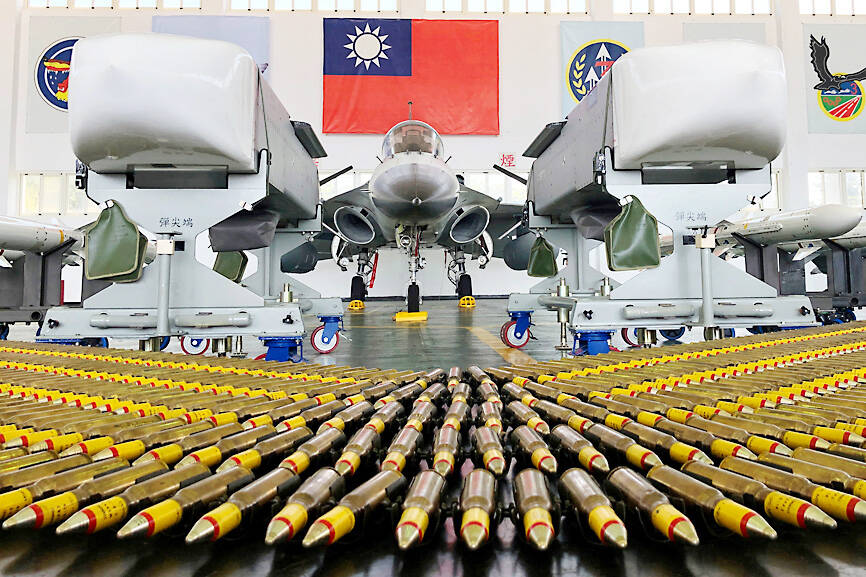The Presidential Office, the Ministry of National Defense and the Ministry of Foreign Affairs yesterday thanked the US for approving a US$500 million arms sale package to Taiwan on Wednesday.
The US Department of State approved the sale of F-16 Infrared Search and Track systems and related equipment for an estimated cost of US$500 million, the US Defense Security Cooperation Agency said in a press release.
The agency delivered certification notifying the US Congress of the sale on the same day, it said.

Photo: Yimou Lee, Reuters
“This proposed sale serves US national, economic and security interests by supporting the recipient’s continuing efforts to modernize its armed forces and to maintain a credible defensive capability,” it said.
The sale can help improve Taiwan’s security and maintain regional political stability, military balance and economic progress, it said.
In Taipei yesterday, the Ministry of National Defense said that the sale, which is expected to take effect in one month, would bolster the ability of its fleet of F-16s to detect and track long-distance targets, and greatly enhance the effectiveness of air combat.
The foreign ministry thanked the US government for continuing to help the nation to improve its self-defense capabilities in accordance with the Taiwan Relations Act and the “six assurances.”
This is the 11th arms sale approved by the administration of US President Joe Biden, which has continued its policy of normalizing arms sales to Taiwan and demonstrated that it considers Taiwan’s defense needs a high priority, the foreign ministry said.
Taiwan will continue to demonstrate its self-defense determination, strengthen the national defense force and safeguard national security and interests, Presidential Office spokeswoman Olivia Lin (林聿禪) said.
It will also continue to deepen its security partnership with the US, as well as cooperate with like-minded countries to jointly safeguard peace, stability and prosperity in the Taiwan Strait and the Indo-Pacific region, Lin said.
Meanwhile, the Executive Yuan approved a NT$440.6 billion (US$13.86 billion) national defense budget — or about 2.5 percent of GDP — as part of the proposed general budget for next year, the Cabinet told a post-meeting news conference.
The figure would be a year-on-year increase of 7.7 percent, or NT$31.4 billion, Cabinet officials said.
If the NT$94.3 billion special budget for obtaining new fighter jets and missiles are included, total military expenditure would rise to NT$543.9 billion, an annual increase of 3.3 percent, or NT$17.4 billion, they said.
Adding NT$71.9 billion in nonprofit special funds, national defense spending for next year would rise to NT$606.8 billion, an increase of NT$31.4 billion from this year, officials said.
Excluding all special budget items, non-profit and for-profit special funds and other unlisted expenditures, the nation’s military spending would comprise 15 percent of the general budget, or NT$431.2 billion, they said.
If the Legislative Yuan passes the budget, it would mean that defense expenditure would have increased 38 percent since President Tsai Ing-wen (蔡英文) took office eight years ago, Premier Chen Chien-jen (陳建仁) told reporters.
According to the Directorate-General of Budget, Accounting and Statistics, next year’s proposed national defense budget includes NT$130.6 billion in military investments and NT$179 billion in personnel costs.

A car bomb killed a senior Russian general in southern Moscow yesterday morning, the latest high-profile army figure to be blown up in a blast that came just hours after Russian and Ukrainian delegates held separate talks in Miami on a plan to end the war. Kyiv has not commented on the incident, but Russian investigators said they were probing whether the blast was “linked” to “Ukrainian special forces.” The attack was similar to other assassinations of generals and pro-war figures that have either been claimed, or are widely believed to have been orchestrated, by Ukraine. Russian Lieutenant General Fanil Sarvarov, 56, head

SAFETY FIRST: Double the number of police were deployed at the Taipei Marathon, while other cities released plans to bolster public event safety Authorities across Taiwan have stepped up security measures ahead of Christmas and New Year events, following a knife and smoke bomb attack in Taipei on Friday that left four people dead and 11 injured. In a bid to prevent potential copycat incidents, police deployments have been expanded for large gatherings, transport hubs, and other crowded public spaces, according to official statements from police and city authorities. Taipei Mayor Chiang Wan-an (蔣萬安) said the city has “comprehensively raised security readiness” in crowded areas, increased police deployments with armed officers, and intensified patrols during weekends and nighttime hours. For large-scale events, security checkpoints and explosives

PUBLIC SAFETY: The premier said that security would be tightened in transport hubs, while President Lai commended the public for their bravery The government is to deploy more police, including rapid response units, in crowded public areas to ensure a swift response to any threats, President William Lai (賴清德) said yesterday after a knife attack killed three people and injured 11 in Taipei the previous day. Lai made the remarks following a briefing by the National Police Agency on the progress of the investigation, saying that the attack underscored the importance of cooperation in public security between the central and local governments. The attack unfolded in the early evening on Friday around Taipei Main Station’s M7 exit and later near the Taipei MRT’s Zhongshan

REBUFFED: In response to Chinese criticism over recent arms sales, Washington urged Beijing to engage in meaningful dialogue instead of threats and intimidation Washington’s long-term commitment to Taiwan would not change, the US Department of State said yesterday, urging Beijing to stop pressuring Taiwan and engage in meaningful bilateral dialogues. The remarks came in response to a backlash from Beijing about Washington’s latest approval of arms sales to Taiwan. The US Defense Security Cooperation Agency said in a statement on Wednesday that the Taipei Economic and Cultural Representative Office in the US has asked to purchase an arms package, including Tactical Mission Network Software; AH-1W helicopter spare and repair parts; M109A7 self-propelled howitzers; HIMARS long range precision strike systems; tube-launched, optically tracked, wire-guided missiles; Javelin